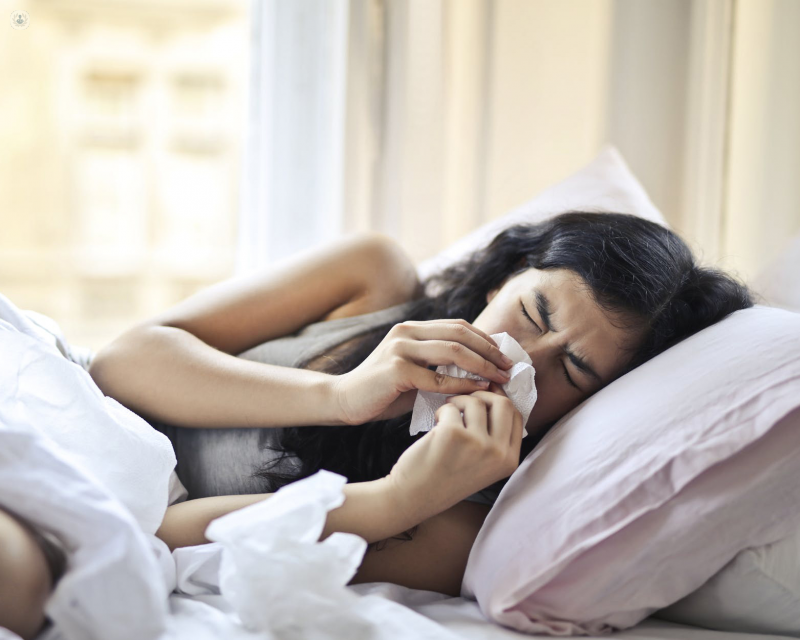Treating allergic rhinitis: what to do to control symptoms
Escrito por:Allergic rhinitis is often triggered by dust mites, pollen, animal hair or mould and can often present with similar symptoms of a cold, such as a runny nose and sneezing. If you’re prone to allergies, you might just be wondering what you can do to prevent a flare-up from occurring. Thankfully, one of our expert ENT surgeons Mr Paul Chatrath is here to give his tips on how you can manage and control your allergic rhinitis.

What is allergic rhinitis?
Allergic rhinitis is inflammation of the lining of the nose caused by an allergy to something. The body mounts an immune reaction that is more aggressive than if your nose is just irritated by something such as dust. This means that the symptoms tend to be more exaggerated with an allergy. Symptoms include a blocked nose, runny nose, sneezing and itching, as well as eye symptoms too.
What are common allergens that trigger this condition?
The common allergens are substances that you breathe in, for example, house dust mite, grass or tree pollens, pets such as cats or dogs, feathers, and various types of moulds or fungi.
Some of these occur seasonally (pollen), others all year round (house dust mite). Food allergies very rarely cause allergic rhinitis, unless the food allergy is severe enough to cause gastrointestinal symptoms as well.
What are some effective self-help techniques?
Allergy avoidance is key. This is possibly the most powerful treatment option and depending on your particular allergy, you could adhere to the following:
- Pets - don’t let them go into the bedroom, wash your hands after stroking them, use a good air purifier
- Grass - shut the windows when you cut the grass
- House dust mite - use an anti-allergy pillow and mattress protector, change your pillow if it is old, consider changing carpets for wood floors and curtains for blinds as the next step.
I recommend using saline or salt water rinses daily to help rinse out the allergen, which you are reacting to, or try using steam inhalations.
What over-the-counter medication can patients try?
Over the counter, you can try an antihistamine or nasal steroid sprays. If you are particularly blocked you can use a decongestant spray such as Sudafed for five to seven days max.
When should a patient visit a doctor and what treatments can they offer?
Visit a doctor if your symptoms are particularly severe and if you have tried the above but symptoms are not improving, or if you have a very sensitive reaction to something that you cannot avoid (eg. a gardener who is allergic to grass), or if your symptoms are exclusively or mainly one-sided.
Is immunotherapy effective for allergic rhinitis?
Immunotherapy can work if you have a particularly severe allergy and standard medications are not working, or if you have a very sensitive reaction to something that you cannot avoid. There are different types, subcutaneous injection or sublingual (under the tongue) preparations. They are best for people with one or two severe allergies rather than multiple allergies.
If you would like to discuss your symptoms of allergies with a professional, do not hesitate to book an appointment with Mr Chatrath via his Top Doctors profile here today.


